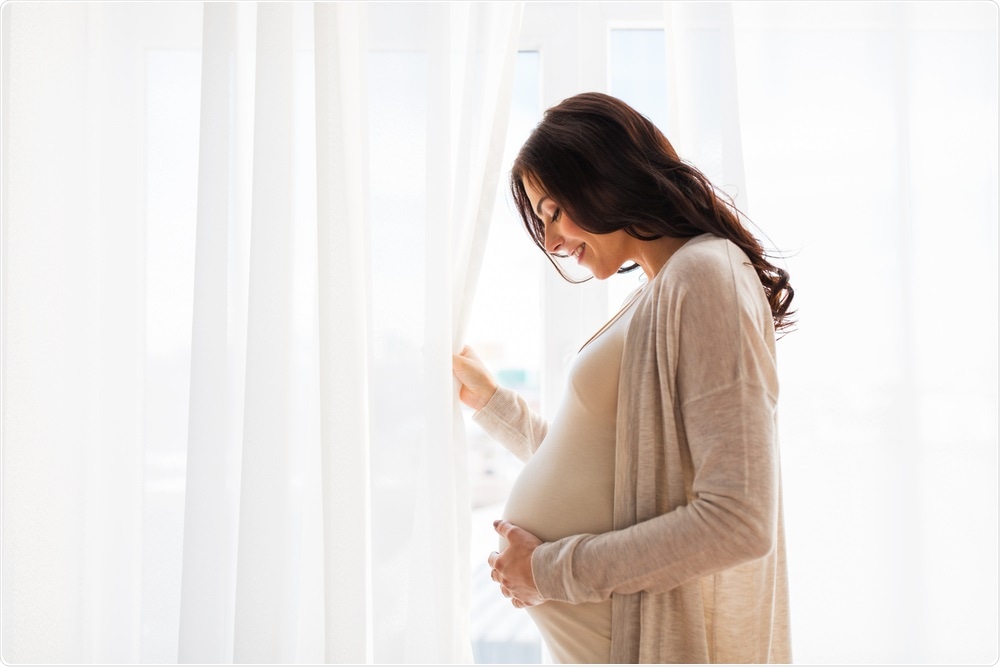A new study demonstrates that women in their third trimester are unlikely to pass a SARS-CoV-2 infection onto their babies. The research also shows that the rates that maternal SARS-CoV-2 antibodies are transferred via the placenta are lower than expected.

Pregnant Woman. Image Credit: Syda Productions/Shutterstock.com
Reassurance for mothers: COVID-19 infection unlikely to pass to the fetus
A National Institutes of Health (NIH)-funded study has revealed that women infected with SARS-CoV-2 who are in their third trimester of pregnancy are not likely to pass that infection onto their babies.
The study, published this month in the journal JAMA Network Open, collected and analyzed data from a total of 127 pregnant women admitted to Boston hospitals in the spring of 2020, amid the COVID-19 pandemic. Of these women, 64 tested positive for SARS-CoV-2 and all of the newborns of this group tested negative for the virus.
The study’s results provide reassurance that newborns are highly unlikely to contract the SARS-CoV-2 virus from infected mothers.
COVID-19 virus found in respiratory fluids, but not blood
The study, which was conducted in the US, aimed to gather evidence on the transmission of COVID-19 from mother to baby, an area that is of clear concern and importance to new families as well as global healthcare systems. Researchers measured levels of the SARS-CoV-2 virus in maternal respiratory, blood, and placental tissues. Also, levels of maternal antibodies were investigated, with researchers looking into how well SARS-CoV-2 antibodies were transferred to the fetus.
Women participating in the study who tested positive for SARS-COV-2 were shown to have levels of the virus within their saliva, nasal and throat secretions, however, the virus was not detected in the bloodstream or the placenta. The absence of SARS-COV-2 in the blood and placenta is thought to unpin the lack of transmission of the virus from mother to child.
Additionally, researchers also demonstrated that levels of SARS-CoV-2 antibodies passed through the placenta were lower than expected. These findings indicate that antibodies specific to SARS-CoV-2 do not pass as easily through the placenta as antibodies specific to other viruses, such as influenza-specific antibodies. Lower than expected levels of transmission of SARS-CoV-2 antibodies were observed regardless of the severity of the woman’s COVID-19 infection.
The researchers stress that further studies will be needed to determine why SARS-CoV-2 antibodies do not pass as easily through the placenta as other antibodies. If the antibodies could pass through at higher rates, newborns would be less vulnerable to SARS-CoV-2 infection. The researchers also point out that further studies are required to gather evidence on how the transmissions of lower levels of SARS-CoV-2 antibodies impact the health outcomes of babies born preterm due to the link between COVID-19 and an increased risk of preterm labor.
Finally, the study demonstrated that while the placentas of women infected with COVID-19 were similar to those of uninfected women, their findings showed that COVID-19 infection increased a mother’s risk of reduced blood from to the placenta, with the effects being elevated in those with more severe COVID-19 infections. In addition, researchers found that the two major molecules used by COVID-19 were present placentas of women infected with the virus, however, these molecules were rarely found expressed in the same location, suggesting why the placenta is rarely affected by the virus.
The study’s findings will likely improve care for mothers testing positive for COVID-19, as well as paving the way for future researchers that may facilitate the development of new vaccination strategies for pregnant women.
Journal reference:
- Edlow AG, et al. Assessment of maternal and neonatal SARS-CoV-2 viral load, transplacental antibody transfer, and placental pathology in pregnancies during the COVID-19 pandemic. JAMA Network Open DOI: 10.1001/jamanetworkopen.2020.30455 (2020)